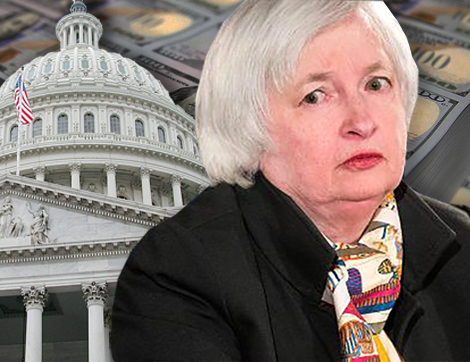
• Yellen told her job is to keep currency, financial system stable, not to create jobs.
By Mark Anderson —
House Financial Services Committee Chairman Thomas Jeb Hensarling (R-Texas) and Representative John Michael “Mick” Mulvaney (R-S.C.) laid into Federal Reserve Chair Janet Louise Yellen for more than 30 minutes even before she made her opening remarks, during the Fed’s Semiannual Monetary Policy Report to the Congress (begins at 21:50), held February 10 in the House. She addressed the Senate’s banking panel February 11.
Amid the toughest questioning of Ms. Yellen in recent memory, Mulvaney said that when Congress created the Fed via the 1913 Federal Reserve Act, the private central bank’s mandate was understood as being limited to keeping the financial system and the currency stable.
But while spotlighting the Fed’s modern-day overreach, Mulvaney told Ms. Yellen, “Maybe you shouldn’t be involved in trying to get us to full employment—something your own economic orthodoxy teaches us you don’t have the ability to do.”
That’s a reference to what Ms. Yellen often describes as the Fed’s core congressional mandate: to keep inflation around 2% and pursue “maximum” employment. But Mulvaney also took issue with the Fed having grown into a regulatory monster via the 2010 Dodd-Frank Wall-Street-Reform and Consumer Protection Act.
He said that law has given the nation a central bank that impacts the people’s purchasing power, how they invest and save, and whether or not they’re employed—even while impacting mortgages and credit cards.
Emigrate While You Still Can! Learn More . . .
In another twist, Mulvaney noted that the Fed deliberately withheld from two congressional committees its “plans to prioritize debt payments during the last government shutdown.”
Mulvaney called this stonewalling a “political decision” on the Fed’s part, apparently done to keep Congress in the dark on the details of making the nation’s principal and interest payments. While fingering the New York Fed branch—the strongest of the Fed’s 12 regional branches—Mulvaney added that Treasury Secretary Jacob Joseph “Jack” Lew was involved.
Hensarling, agreeing that the Fed is becoming even more of a financial overlord, lamented that Americans may wake up one day to discover, “Our central bankers have become our central planners.”
He derided the Fed for prompting investor actions that caused “the inflation of dangerous asset bubbles, the deflating of which we are likely seeing in our turbulent equity markets.” Hensarling then sharply told Ms. Yellen: “Not only does this harm economic growth, it is an affront to due process, checks and balances, and the rule of law.”
Soon thereafter, however, Ms. Yellen delivered her opening statement—a recitation of the Fed’s recent and expected actions, which, as usual, was as mesmerizing as it was dry.
Finally, however, some verbal sparring took place, especially when committee Vice Chairman Representative Patrick Timothy McHenry (R-N.C.) raised a rarely heard subject—that, under its expansive regulatory powers, the Fed is becoming directly involved on the boards of directors of Fed-member banks.
McHenry pointedly asked Ms. Yellen to pledge that she’d make sure the Fed’s regional bank examiners “stop this practice.”
“Well, I’ll look into . . . ” she started saying, but McHenry cut her off and told her, “Well, you’ve already looked into it; you’ve already exchanged letters with [Hensarling]. . . . I assume you are aware that this is taking place, are you not?”
Looking perturbed, the esteemed oracle of central finance replied: “I’m not certain it’s inappropriate. I want to get back to you on that.”
McHenry added: “The Fed directed one of your member banks to incorporate two additional members [on] their board of directors. . . . The Fed directing a private enterprise to change their board of directors seems somewhat perplexing. Do you feel that’s appropriate authority for the Fed?”
Ms. Yellen replied, “Well, I think it’s appropriate as a matter of supervision . . . to ensure the board of directors of a financial company that we supervise is appropriately constituted and fulfilling its . . . function.”
But the big-picture hypocrisy of the Fed’s broadening regulatory powers was overlooked. The Fed moves mountains to prevent Congress from closely examining, let alone regulating, its cryptic monetary mechanics, calling such supervision “political.” Yet the Fed is now considered by some in Congress to be the largest regulatory body in the U.S., long ago having seized the constitutional authority of Congress to “coin money and regulate the value thereof.” That is way beyond “political.”
Ms. Yellen did concede that, given the Fed’s relatively new regulatory role, Congress technically has the right to supervise the Fed’s supervisory function. But she’s clearly uncomfortable with Congress becoming more assertive.
Even the relatively modest Fed Oversight Reform and Modernization Act of 2015, or FORM Act of 2015, is too much for her. That bill calls for more openness about the substance and purpose of the Fed’s monetary policy, while still preserving the Fed’s independence to both formulate and execute such policy. A committee press release noted, “A group of Nobel Prize-winning economists and former senior economic policy officials” support the FORM bill.
The Senate hasn’t acted on the FORM Act. President Barack Hussein Obama has pledged to veto it. While straight Fed-audit bills tend to die prematurely, FORM has some merit, in that it would begin the process of exposing the Fed’s secretive monetary policy. Call Congress to applaud this unusually tough questioning of Ms. Yellen and urge a FORM expansion—ideally toward divorcing the Fed altogether. The numbers are 202-224-3121 or 225-3121.
Mark Anderson covers the annual Bilderberg meetings and is chairman of AFP’s new America First Action Committee, designed to involve AFP readers in focusing intensely on Congress to enact key changes, including monetary reform and a pullback of the warfare state. He and his wife Angie often work together on news projects.

